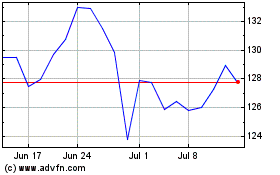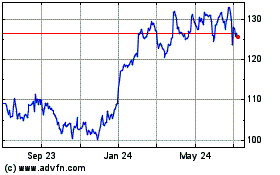Reckitt Agrees to Mead Deal -- WSJ
February 11 2017 - 3:02AM
Dow Jones News
By Saabira Chaudhuri
LONDON -- Reckitt Benckiser Group PLC on Friday said it agreed
to buy baby-food maker Mead Johnson Nutrition Co. for $16.6
billion, a deal that will almost double the size of the British
company's consumer-health business and push it deeper into emerging
markets.
Reckitt, whose lineup includes Durex condoms and Scholl
foot-care products, earlier this month disclosed that it was in
talks with Mead after The Wall Street Journal reported on the
potential deal. It will pay $90 a share in cash for the Glenview,
Ill.-based company, which makes a range of nutritional products
including Enfamil infant formula and the Sustagen milk supplement
for children.
Including debt, the deal is valued at $17.9 billion.
The acquisition caps a yearslong search by Chief Executive
Rakesh Kapoor, who lost out to Bayer AG in a bidding war for Merck
& Co.'s consumer business in 2014 and has since been seeking a
major acquisition.
Reckitt's growth has slowed lately, leaving the Slough,
England-based company in need of a way to jump-start sales. On
Friday, the company, which also has household-cleaning,
personal-hygiene and food businesses, reported organic revenue
growth of just 3% for 2016. The measure, which excludes currency
effects and acquisitions and divestments, was the weakest in over a
decade.
Sales have suffered from a string of issues, including a failed
foot-care innovation, a scandal in South Korea that led to a
Reckitt product being withdrawn and the disruption of consumer
spending in India after some high-value bills were taken out of
circulation.
Shares rose in early trading in London but finished down nearly
3%. Reckitt on Friday forecast 2017 organic revenue growth of 3%,
which is below analyst estimates.
Mr. Kapoor said Mead Johnson meshes well with Reckitt's
consumer-health portfolio, as did its acquisition of condom and
foot-care brands in the past. "Our strategy is about healthier
lives and homes," he said. "Their mission is about enabling
healthier lives from the very beginning."
He identified child nutrition as a solid opportunity, saying the
category's sales are projected to grow by 3% to 5% over the medium
to long term.
Mead Johnson had net sales of $3.7 billion in 2016, down 8%.
Half the company's sales came from Asia, with 17% coming from Latin
America and the rest from North America and Europe.
The deal will turn China into Reckitt's second-biggest market,
increasing its emerging-markets footprint by two-thirds. The deal
will also significantly boost the company's exposure to the U.S.,
which remains its No. 1 market.
Analysts have expressed skepticism about the deal's cost-saving
possibilities, saying there are few obvious synergies beyond some
distribution and head-office cuts. "This deal does have elements of
desperation about it," Exane BNP Paribas analyst Jeff Stent said
following Reckitt's initial confirmation that it was in talks to
buy Mead. "Mead has zero overlap with Reckitt."
Reckitt said the acquisition would boost per-share earnings by a
double-digit percentage by the third year after closing, a
projection Mr. Stent on Friday described as "very conservative,"
likely tied to low savings and the high cost of funding the deal.
Reckitt forecast cost savings of GBP200 million ($249.9
million).
Investor cheered the deal when it was first broached. They saw
it raising Reckitt's exposure to faster-growing, higher-margin
categories in the long term; plus, Mead's struggles of late made it
a good time for an approach despite the pound's decline following
Brexit.
Mead's shares have fallen sharply in the past two years as the
company grappled with sluggish sales in its key Asia market, and
they were down 2.7% this year before news of the deal broke. In
Friday trading, they were ahead 5.5% at $87.60.
"I don't think you should read too much into the timing," Mr.
Kapoor told journalists on a conference call, saying Reckitt had
been looking at Mead and other companies "for a number of
years."
Reckitt on Friday reported organic sales growth of 1% in Europe
and North America last year, while emerging markets grew by more
than 8%. Profit rose 5% to GBP1.83 billion.
Robey Warshaw, Bank of America Merrill Lynch, Deutsche Bank and
HSBC advised Reckitt. Goldman Sachs and Morgan Stanley advised Mead
Johnson.
--Tapan Panchal contributed to this article.
Write to Saabira Chaudhuri at saabira.chaudhuri@wsj.com
(END) Dow Jones Newswires
February 11, 2017 02:47 ET (07:47 GMT)
Copyright (c) 2017 Dow Jones & Company, Inc.
Merck (NYSE:MRK)
Historical Stock Chart
From Mar 2024 to Apr 2024

Merck (NYSE:MRK)
Historical Stock Chart
From Apr 2023 to Apr 2024
